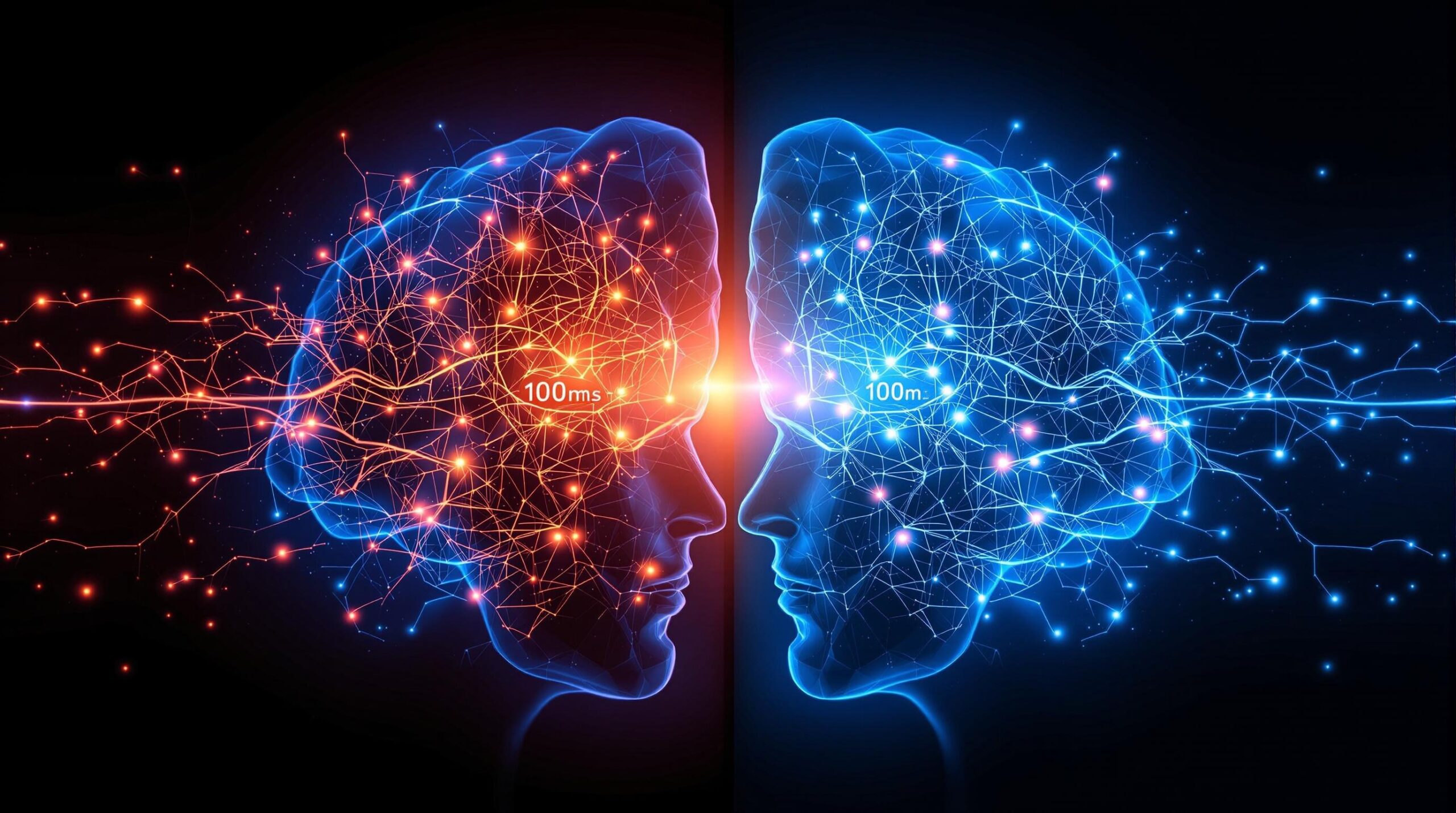Maybe you’ve been in a meeting where everyone knew the right answer—until someone mentioned the quarterly numbers. Suddenly the clear choice felt complicated. Leaders today face unprecedented ethical complexity. AI adoption decisions, stakeholder conflicts, regulatory uncertainty—these dilemmas don’t come with obvious answers. Yet research reveals that moral decisions aren’t mysterious. They follow predictable patterns shaped by brain biology and learned rules.
Understanding these patterns helps professionals navigate situations where principles collide with pragmatic pressures. Studies show confidence in ethical choices increases when the value difference between options is clearer, with “higher subjective confidence in moral decisions when the subjective value difference between self-harm and other-harm options was larger” (Collabra: Psychology, 2024). This finding points to something leaders can control: the clarity with which they examine consequences.
Moral psychology is not philosophical speculation about what people should do. It is the scientific study of how people actually make ethical choices, examining the cognitive processes and emotional responses that shape decisions beyond legal requirements. This field offers frameworks that bridge timeless wisdom with contemporary neuroscience.
Quick Answer: Moral psychology reveals that ethical decisions operate through dual processes—fast emotional responses (System 1) and slow deliberative reasoning (System 2)—with confidence increasing when consequences are clearer and choices learned through feedback rather than fixed traits.
Definition: Moral psychology is the scientific study of how people make ethical choices, examining the cognitive processes, emotional responses, and learned patterns that shape decision-making beyond legal requirements.
Key Evidence: According to Collabra: Psychology, research with 369 participants found “subjective confidence in moral decisions when the subjective value difference between self-harm and other-harm options was larger.”
Context: This dual-process framework explains why leaders sometimes make reactive decisions they later regret—intuition dominates personal dilemmas while deliberation handles complex trade-offs.
Moral psychology works because it externalizes the invisible processes driving ethical choices, creating distance between impulse and action. When leaders understand that emotional presets activate differently than rational deliberation, they gain the ability to recognize which system is operating and when to override automatic responses. The benefit accumulates over time as pattern recognition replaces reactive decision-making.
The sections that follow will walk you through the dual-process framework, explain why laboratory findings often fail to predict real behavior, and provide actionable strategies for cultivating principled judgment in complex organizational contexts.
Key Takeaways
- Dual cognitive systems shape every ethical choice—emotion-driven intuition and rational deliberation activate differently depending on whether dilemmas feel personal or impersonal, according to research by Joshua Greene at Harvard University.
- Confidence correlates with clarity—decision-makers feel more certain when value differences between options are explicit and stakes are mapped for all stakeholders.
- Moral rules are learned, not fixed—people construct ethical preferences through feedback and readily shift toward utility when principles conflict, as documented in PLOS ONE research.
- Laboratory findings diverge from real behavior—hypothetical scenarios fail to predict actual conduct under social and career pressures, according to the Association for Psychological Science.
- Internal conflict is normal—ethical leadership involves competing values, not easy answers, requiring frameworks that normalize struggle rather than expecting clarity.
How Moral Psychology Explains Ethical Decision-Making
You might expect that ethical choices come from either pure logic or pure feeling. Research shows it’s neither—and both. For decades, scholars debated whether morality stemmed from reason or emotion. Contemporary neuroscience reveals that both systems operate, each serving different purposes. Understanding this dual nature equips leaders to navigate dilemmas with greater discernment.
According to Joshua Greene, psychologist at Harvard University, moral decision-making follows a “dual-process theory” where “emotional presets (fast, inflexible) guide intuitive choices, while rational manual mode (slow, adaptable) handles complex scenarios” (Harvard Magazine, 2011). Brain imaging demonstrates these aren’t just theoretical constructs. They represent biologically distinct pathways. System 1 thinking—intuitive and emotion-driven—dominates personal dilemmas where relationships and identity are at stake. System 2—deliberate reasoning—engages with impersonal, complex trade-offs involving abstract stakeholders.
Greene’s research established that “emotion dominates personal dilemmas, rationality impersonal ones” with different neural circuits activating depending on the nature of the ethical choice (Harvard Magazine, 2011). This finding explains patterns leaders recognize but often can’t name. When facing a colleague’s misconduct, emotional responses fire immediately. When evaluating a policy affecting thousands of employees you’ve never met, rational calculation takes over. Neither system is superior—both serve different purposes.
This mechanism works through three stages: first, the brain detects whether a dilemma feels personal or abstract; second, the appropriate system activates (emotion for personal, reason for impersonal); third, the dominant system generates a judgment that feels intuitively correct. That final step is where leaders often get stuck—the judgment feels right because one system dominated, not because all relevant factors were weighed. Recognizing which system is active creates the possibility of engaging the other deliberately.

The Confidence-Clarity Connection
Research reveals that “learning consistency for moral rule 1 correlated with transfer consistency at r(38)=0.77, p<.001 when congruent with utility-dominant options” (PLOS ONE, 2024). This correlation demonstrates something actionable: people feel more confident in ethical choices when consequences are explicit. Leaders experience greater uncertainty when outcomes remain ambiguous, particularly when decisions harm others.
The practical implication is straightforward. Investing time to map stakeholder trade-offs—who benefits, who bears costs, over what timeframe—increases both decision confidence and ethical fidelity. Notice how different this is from rushing to judgment or hoping clarity will emerge. The confidence comes from doing the work of making consequences visible, not from having an obvious answer.
Why Leaders Make Different Choices Under Pressure
A troubling gap exists between how people reason about ethics in theory and how they behave under real-world pressure. You might answer a hypothetical dilemma one way in a training session, then face a similar situation at work and choose differently. That inconsistency isn’t hypocrisy—it’s how human moral reasoning operates.
Research demonstrates that “people make different moral choices in imagined versus real-life situations,” revealing that laboratory ethics don’t translate to actual behavior (Association for Psychological Science, 2016). This finding challenges the assumption that abstract ethics training prepares leaders for genuine dilemmas involving career risk, peer influence, and institutional constraints.
The explanation lies in how moral preferences form. Contrary to traditional views that treat ethics as stable character traits, contemporary evidence shows people construct ethical judgments “on the fly” through flexible learning. They readily acquire new moral rules and transfer them to unfamiliar contexts. But here’s the complication: when learned moral rules conflict with utility maximization, participants “shifted toward utilitarian choices” prioritizing pragmatic outcomes over principles (PLOS ONE, 2024).
This pattern shows up constantly in organizational life. A company states values of transparency and stakeholder care. Then a crisis hits, and leaders default to damage control and legal protection. Studies reveal that moral decision-making is “rife with internal conflict” even when individuals engage deliberate reasoning (University of California, 2017). The struggle between principles and pragmatism is built into the cognitive architecture.
One common pattern looks like this: a leader knows the right answer in a calm moment. Then the actual situation arrives—the boss expects a certain outcome, the team’s jobs depend on the decision, the quarterly numbers are at stake. Suddenly the choice feels different. System 1 activates with concerns about relationships, reputation, and consequences. System 2 tries to rationalize why the pragmatic path serves everyone better. The shift happens so quickly that most people don’t notice which system is driving.
The Learning vs. Character Debate
Traditional virtue ethics assumed people possessed stable character traits that predicted behavior across contexts. Contemporary evidence tells a different story. Moral rules are learned through experience and readily transferred to new contexts. This shift has profound implications for leadership development. It suggests that ethical capacity can be cultivated rather than simply selected for.
Organizations inadvertently teach that principles bend when profits are at stake unless systematic formation mechanisms exist—regular reflection on decisions, accountability for ethical fidelity, and cultural reinforcement of long-term integrity over short-term gains. The question isn’t whether your organization is teaching moral psychology. It’s what lessons the feedback systems are encoding.
Applying Moral Psychology to Professional Decision-Making
Understanding cognitive processes is useful only if it changes practice. Leaders can strengthen principled decision-making by applying three insights from moral psychology to everyday situations.
First, increase confidence by clarifying value trade-offs before deciding. When facing complex dilemmas—AI adoption policies that balance efficiency with workforce dignity, market entry decisions that affect vulnerable communities, restructuring choices with competing stakeholder impacts—resist the urge to decide quickly. Map who benefits, who bears costs, and over what timeframe. Research demonstrates that subjective confidence correlates with clearer value differences. Making consequences explicit for all parties doesn’t guarantee easy answers, but it enables the discernment that integrity requires. This is especially true when your choice will harm someone—that’s when uncertainty naturally increases and when deliberate examination matters most.
Second, deliberately engage System 2 reasoning when emotional presets dominate. Leaders naturally experience strong gut reactions to personal, relational dilemmas—a colleague’s misconduct, a termination decision, a betrayal of trust. These emotional responses encode legitimate concerns about relationships and reputation. They can also reflect biases, incomplete information, or self-protective instincts. Practice the discipline of naming your immediate reaction, then stepping back to examine the situation through multiple frameworks. What serves long-term stakeholder trust? What precedent does this set? What would accountability to our stated values require? This slow, rational mode enables more principled outcomes than reactive choices, according to frameworks for navigating ethical dilemmas.
Third, build organizational learning systems that cultivate discernment through real-world feedback, not just hypothetical training. Research shows people readily learn ethical rules and transfer them to new contexts, but default to utilitarian calculations when principles conflict with outcomes. Counter this tendency by creating regular forums where teams reflect on past decisions, examine what values were honored or compromised, and adjust future approaches. After major choices—entering new markets, adopting technologies, restructuring teams—convene stakeholders to assess not just business results but ethical fidelity. This ongoing practice builds character at both individual and organizational levels.
Common mistakes include over-relying on compliance programs that check boxes without forming judgment, trusting intuition uncritically in complex situations where multiple values compete, and treating ethics as individual responsibility rather than cultural infrastructure. One practical example: establish an “ethics pause” protocol for high-stakes decisions. Before finalizing the choice, teams must explicitly articulate what principles are at risk, who lacks voice in the process, and what unintended consequences might emerge. This intervention leverages the dual-process insight that slowing down enables rational override of emotional presets, as outlined in step-by-step ethical decision-making frameworks.
Best practices involve normalizing the internal conflict inherent in ethical leadership. When teams surface competing values without fear, when leaders model vulnerability about hard trade-offs, and when organizations reward long-term integrity over short-term pragmatism, principled action becomes embedded in culture rather than dependent on individual heroism. If you find yourself avoiding these conversations—especially when they might reveal past compromises—that avoidance is information, not failure. It signals where the real work begins.
The Future of Moral Psychology in Leadership
An emerging challenge is reshaping how leaders think about ethical decision-making: artificial intelligence. As algorithms increasingly mediate stakeholder relationships—from hiring to customer service to resource allocation—professionals must discern when to defer to data-driven recommendations and when to exercise human judgment. Does reliance on computational models enhance consistency or erode discernment? Early research suggests both possibilities depending on implementation.
The long-term effects of AI systems on moral confidence remain understudied. When people learn moral rules from feedback, what values get encoded when algorithms optimize for narrow metrics like efficiency, engagement, or profit? This question sits at the intersection of technology ethics and leadership practice. Organizations deploying AI without examining these dynamics risk inadvertently teaching that principles bend when data recommends it, as explored in research on ethically poor decisions.
Neuroscience advances promise to reveal how brain plasticity affects moral conceptions over the lifespan. This research could illuminate whether and how philosophical training, deliberate reflection, and ethical formation actually rewire decision-making patterns. Some organizations are already shifting from one-time compliance training to ongoing cultivation through ethics councils, case-based learning, and structured reflection on decision outcomes. These practices align with findings that moral capacity develops through feedback rather than fixed character.
The field is moving toward ecological methodologies that capture actual decisions under social and economic pressure rather than laboratory scenarios. Future studies will likely follow professionals through genuine dilemmas to understand what factors—personality, culture, incentives, relationships—predict principled action versus compromise when stakes are real. This shift reflects growing recognition that moral psychology must account for the full context of human decision-making to offer practical guidance.
An integration opportunity exists between computational models and ancient wisdom traditions—biblical principles, virtue ethics, character formation frameworks that have guided leaders for millennia. Contemporary neuroscience illuminates how the brain processes ethical dilemmas. It offers limited guidance on cultivating the wisdom, humility, and courage that integrity requires. Research exploring how timeless principles interact with cognitive processes could yield frameworks that serve professionals navigating unprecedented complexity.
Why Moral Psychology Matters
Moral psychology matters because ethical decisions shape organizational culture, stakeholder trust, and long-term sustainability in ways that financial metrics fail to capture. When leaders understand the cognitive systems driving their choices, they gain the ability to override emotional presets with principled deliberation. That capacity—to recognize which system is operating and when to engage slow, rational reasoning—determines whether organizations honor stated values under pressure or default to pragmatic compromises. The difference compounds
Frequently Asked Questions
What does moral psychology mean?
Moral psychology is the scientific study of how people actually make ethical choices, examining the cognitive processes and emotional responses that shape decisions beyond legal requirements.
How does dual-process theory work in ethical decisions?
Dual-process theory shows that emotional presets (System 1) guide intuitive choices while rational deliberation (System 2) handles complex scenarios, with different systems activating based on whether dilemmas feel personal or impersonal.
Why do people make different moral choices under pressure?
Research shows people make different moral choices in real-life versus imagined situations because learned moral rules often conflict with utility maximization, causing shifts toward pragmatic outcomes over principles when stakes are real.
What is the difference between System 1 and System 2 thinking in ethics?
System 1 is fast, emotion-driven thinking that dominates personal dilemmas involving relationships, while System 2 is slow, deliberate reasoning that handles impersonal trade-offs with abstract stakeholders.
How does confidence relate to moral decision-making?
Studies show higher subjective confidence in moral decisions when the value difference between options is larger, meaning people feel more certain when consequences are explicit and trade-offs are clearly mapped.
Are moral rules learned or fixed character traits?
Contemporary evidence shows moral rules are learned through experience and readily transferred to new contexts, contrary to traditional views that treat ethics as stable character traits people possess.
Sources
- Collabra: Psychology – 2024 research on confidence in moral decision-making and value differences
- PLOS ONE – Studies on flexible moral learning and rule transfer in decision contexts
- Indiana University Science Communications – Overview of dual-process theory and System 1/System 2 moral reasoning
- University of California – Findings on internal conflict in moral reasoning processes
- Harvard Magazine – Joshua Greene’s research on the neuroscience of moral judgment
- Association for Psychological Science – Gap between hypothetical and real-world moral behavior
- Penn State Empathy and Moral Psychology Lab – Ongoing research on affective mechanisms in ethical decision-making


